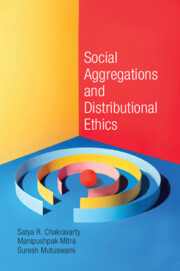Book contents
- Frontmatter
- Contents
- Preface
- 1 Introduction
- 2 Individual and Social Orderings
- 3 May’s Theorem
- 4 Arrow’s Theorem with Individual Preferences
- 5 Relaxing Arrow’s Axioms
- 6 Arrow’s Theorem with Utilities
- 7 Harsanyi’s Social Aggregation Theorem
- 8 Distributional Ethics: Single Dimensional Approaches
- 9 Distributional Ethics: Multidimensional Approaches
- 10 Social Choice Functions
- 11 Strategyproofness on Quasi-linear Domains
- Index
11 - Strategyproofness on Quasi-linear Domains
Published online by Cambridge University Press: 11 January 2023
- Frontmatter
- Contents
- Preface
- 1 Introduction
- 2 Individual and Social Orderings
- 3 May’s Theorem
- 4 Arrow’s Theorem with Individual Preferences
- 5 Relaxing Arrow’s Axioms
- 6 Arrow’s Theorem with Utilities
- 7 Harsanyi’s Social Aggregation Theorem
- 8 Distributional Ethics: Single Dimensional Approaches
- 9 Distributional Ethics: Multidimensional Approaches
- 10 Social Choice Functions
- 11 Strategyproofness on Quasi-linear Domains
- Index
Summary
INTRODUCTION
Following the Gibbard–Satterthwaite theorem, several relaxations of the unrestricted domain assumption have been investigated. We have already discussed single-peaked preferences in the previous chapter, which is a relaxation of the unrestricted domain assumption. A second relaxation of the unrestricted domain assumption amounts to assuming that side-payments are allowed among agents (implying the cardinality of their utility functions). Specifically, in this second kind of relaxation, it is assumed that agents have quasi-linear preferences that are represented with quasi-linear utility functions. This assumption of quasi-linearity creates several strategyproof mechanisms. The economic implications of these strategyproof mechanisms are numerous and have been systematically investigated in the vast literature about Vickrey–Clarke–Groves (or VCG) mechanisms (see Vickrey 1961; Clarke 1971; and Groves 1973). The VCGmechanisms, in its most general form, was specified by Groves (1973), though its special cases were identified earlier—first by Vickrey (1961), who specified the second price auction in the context of auction theory, and then by Clarke (1971), who provided the pivotal mechanism for the non-excludible pure public goods problem. There is another class of mechanisms, known as Roberts’ mechanisms for affine maximizers, that generalizes the VCG mechanisms (Roberts 1980). In this chapter, we discuss these strategyproof mechanisms for quasi-linear domains. The problem of designing strategyproof mechanisms is also referred to as dominant strategy mechanism design problem under incomplete information.
In Section 11.2, we introduce a non-excludible pure public goods problem and introduce the VCG mechanisms and show that this is the unique class of mechanisms that satisfies outcome efficiency (that maximizes the sum of utilities of all the agents from the public decision) and strategyproofness (also called dominant strategy incentive compatibility). We then argue that for the pure public goods problems, the VCG mechanisms fail to satisfy Pareto optimality. We then discuss some nice properties of the pivotal mechanism, which is a specific mechanism in the class of VCG mechanisms that was first identified by Clarke (1971). In Section 11.3, we introduce a single indivisible private good allocation problem and show that the pivotal mechanism of Clarke (1971) is identical to the second price Vickrey auction (Vickrey 1961).
- Type
- Chapter
- Information
- Social Aggregations and Distributional Ethics , pp. 241 - 260Publisher: Cambridge University PressPrint publication year: 2023



